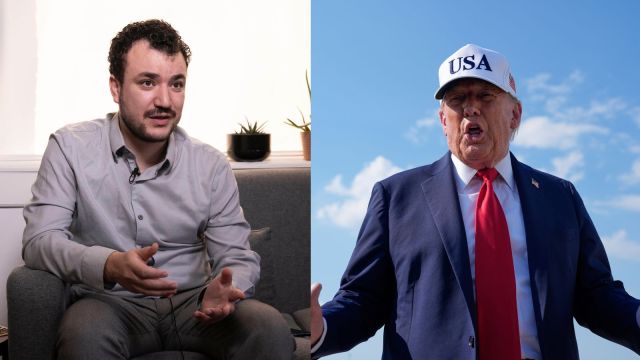Stay updated with the latest - Click here to follow us on Instagram
$20M or an apology: Freed from ICE detention, Mahmoud Khalil’s renewed demand for justice from Trump administration
Khalil, 30, who was a key negotiator and spokesperson during Columbia University's pro-Palestinian campus protests, has filed the complaint under the Federal Tort Claims Act.
 The filing accuses President Donald Trump and other officials of mounting a haphazard and illegal campaign to “terrorize him and his family,” beginning with Mahmoud Khalil’s March 8 arrest. (AP)
The filing accuses President Donald Trump and other officials of mounting a haphazard and illegal campaign to “terrorize him and his family,” beginning with Mahmoud Khalil’s March 8 arrest. (AP)Just weeks after stepping out of an ICE detention facility where he spent over three months in federal custody, Mahmoud Khalil, once a graduate student negotiating peacefully on behalf of Columbia University’s pro-Palestinian protesters, is now demanding justice in a very different arena.
Khalil has filed a $20 million administrative complaint against the Trump administration, accusing it of weaponising immigration enforcement to silence dissent. His claims of false arrest, malicious prosecution, and emotional trauma come as part of a broader battle, not just for his freedom, but for the rights of student activists targeted under a government that labeled him a national threat.
 Khalil, 30, who was a key negotiator and spokesperson during Columbia University’s pro-Palestinian campus protests, has filed the complaint under the Federal Tort Claims Act. It is considered a precursor to a potential federal lawsuit.
Khalil, 30, who was a key negotiator and spokesperson during Columbia University’s pro-Palestinian campus protests, has filed the complaint under the Federal Tort Claims Act. It is considered a precursor to a potential federal lawsuit.
According to the Center for Constitutional Rights, the organisation representing Khalil, the Columbia graduate would use the compensation to “help others similarly targeted by the Trump administration and Columbia University.”
In a press release, the group said: “He would accept, in lieu of payment, an official apology and abandonment of the administration’s unconstitutional policy.”
Khalil had risen to national attention in the spring of 2024 as one of the student leaders of the Columbia encampments in protest of the Israel-Hamas war. A green card holder married to a US citizen, he was arrested in March 2025 by Immigration and Customs Enforcement agents at his New York apartment, the first high-profile pro-Palestinian activist to be detained by ICE under President Donald Trump’s second term.
Trump had vowed to “crush” the protests, describing university campuses as “hotbeds of antisemitism”.
Khalil was transferred to an ICE facility in Louisiana, while the Trump administration pressed in court for his deportation. Officials accused him of supporting Hamas, a charge his legal team denies and for which no formal evidence has been presented.
Citing national security grounds, Secretary of State Marco Rubio determined that Khalil’s presence in the US posed a foreign policy risk. An immigration judge in Louisiana agreed and ordered his deportation.
However, in June, a federal judge in New Jersey barred the Trump administration from deporting or continuing to detain Khalil, calling into question the basis of his arrest.
Khalil was released on June 20 and was greeted by supporters at Newark Liberty International Airport, including fellow activists and members of his legal team.
Despite the release, the Trump administration continues to pursue Khalil’s deportation.
His complaint accuses the State Department, DHS, and ICE of “retaliatory arrest” in violation of his constitutionally protected speech.
It states: “Officials at the highest levels of the United States government publicly lashed out at Mr. Khalil on social media, falsely labeling him a terrorist sympathizer and an antisemite — derogatory charges designed to destroy Mr. Khalil’s reputation, put him in physical danger and cause extreme emotional distress.”
In a statement to ABC News, DHS Assistant Secretary Tricia McLaughlin defended the administration’s actions: “Mahmoud Khalil’s claim that DHS officials branded him as an antisemite and terrorized him and his family is absurd. It was Khalil who terrorized Jewish students on campus. He ‘branded’ himself as antisemite through his own hateful behavior and rhetoric. It is a privilege to be granted a visa or green card to live and study in the United States of America.”
Khalil, however, remains resolute. In his first broadcast interview after release, he vowed to keep “advocating for what’s right” and said he would continue to stand for Palestinian rights, even in the face of government retaliation.
His case is expected to test the limits of immigration enforcement powers and raise fresh legal and political questions about free speech, protest, and the criminalisation of dissent under the Trump administration.





- 01
- 02
- 03


























